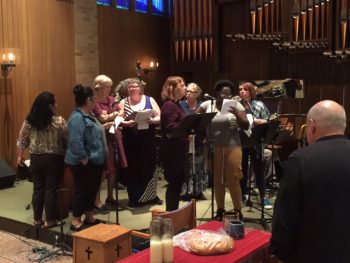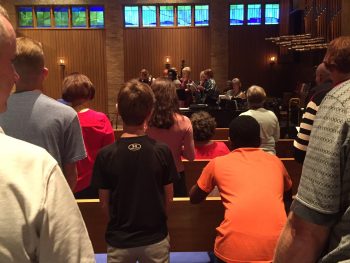Josué Gonzalez didn’t grow up Lutheran. In fact, he was not raised with any type of religion. “I got involved with the Lutheran faith through Todos los Santos/El Milagro in the late 1990s. That’s when I got a taste of the generosity of the Lutheran brotherhood,” he explains.
So, when Josué heard two years ago that Pastor Melissa Melnick was looking for musicians for a new bilingual worshipping community, “I wanted to be a part of it,” he says. “I believe that Tapestry will be an instrument of God to do mission work within the Lutheran community and within the communities and cultures we serve.”

Melissa was pulling together people she was meeting through neighborhood activities in the Richfield area to form a synodically-authorized worshipping community (SAWC) that would offer both a sacred place for people from many different cultural descents to think theologically, as well as providing infrastructure for addressing significant challenges in the community.
Josué is now attending Luther seminary to become a deacon, to be a minister of Word and Service. “I like to serve in the community,” he says. “And, if I were a pastor, it might be more difficult for me to be [as involved] in the community.” As “just one of the people,” Josue feels others can more easily relate to him and talk with him openly, a vocation to which he feels the call of God.
“I believe that what I do today will have a pretty big impact within the community – both the brotherhood of Lutheran churches and the broader communities,” offers Josue. “It’s the mission within the mission. And the possibilities are endless because the Spirit of God moves it.”
GOD’S SPIRIT MOVED in Pastor Melissa’s life, too, as she experienced call to serve in a diverse setting. “I grew up in the church,” Melissa explains. “My dad was a Lutheran youth worker in Baltimore in the 1960s. It was a mostly African-American middle-class community; in fact, I was the first white baby baptized in my church.”
Eventually, the family moved to the Twin Cities, where Melissa’s mother’s family resided. Attending Mount Olive Lutheran Church on Chicago Avenue, the family “went through the Seminex experience while I was at a Missouri Synod Lutheran high school.” She remembers arguing with her classmates about whether women could be pastors.
(Seminex was formed when many faculty members were dismissed from Concordia Seminary in St. Louis because they were deemed to be too liberal. It served as the seminary for the Association of Evangelical Lutheran Churches (AELC) – congregations that left the Lutheran Church—Missouri Synod over the dismissal of the professors. The AELC joined with the Lutheran Church in America and the American Lutheran Church to form the Evangelical Lutheran Church in America in 1988.)
Melissa has been challenging imposed boundaries ever since.
With a Masters in Hispanic Linguistics from the University of Minnesota, Melissa served as an ESL teacher in the Minneapolis and Edina public schools and was a volunteer youth worker at her congregation. She worked with the Integration District, ten school districts committed to serve diverse populations.
“Too often churches are like castles, and the parking lot is like a moat.”
As part of her studies at Luther Seminary, she interviewed pastors around the Twin Cities. She established relationships with pastors in the inner-ring suburbs south and west of Minneapolis. So, when the pastor at Woodlake Lutheran became interested enough in her work, she wrote a proposal to establish a bilingual, multicultural congregation there.

She started reaching out to people surrounding Woodlake, especially at Crossroads, a 700-unit apartment complex with several buildings. “We’d go out with lemonade and cookies at bus stops or in the commons and talk with people,” she shares. “We started asking about the challenges facing the community, as well as the gifts that people thought they could share with others.”
“I’d go out with the plan to listen, but it would eventually come out that I was a pastor,” Melissa explains. “Then, people would want to talk to me about their faith.”
“Too often churches are like castles, and the parking lot is like a moat,” she offers. “The people outside [the castle] don’t necessarily want to go in, and the people inside don’t necessarily want to go out.” But, if we are to bring good news to the poor and relief to the captives, she adds, “We as church must put the drawbridge down.”
At a Mission Developer training, Josué talked about both building bridges and crossing them. She knew this was the calling of the ministry that would become Tapestry.
So Woodlake opened its doors to community meetings of tenants of Crossroads when it was announced that the apartment complex would be “changing.” Rents would rise, often more than 50 percent; gentrification would require most of the current residents to leave. “The tenants talked about their struggles and hopes; they were able to meet with elected leaders to demand support.” In the end, the apartments, home to so many of her contacts, “transitioned,” and the residents were spread out through the metro.
TAPESTRY was relaunched on the first Sunday of October at Oak Grove Lutheran Church in Richfield, Minnesota. Dozens of people from many different places of origin gathered to sing, pray, and share a meal.
“It was inspiring to see how excited Pastor Tom Zarth is to have Tapestry at Oak Grove,” says the Rev. Deb Stehlin, director for evangelical mission for the Minneapolis Area Synod. “He said [to me], ‘We need them.’”
According to Melissa, a dozen ELCA congregations are partnering in some way with this attempt to be church together. In response, Tapestry is a ministry with two branches – one to its community and the other to Lutheran congregations. Its music ministry goes out to congregations and Melissa provides guest preaching as a way for more churches to hear about the diversity within Twin Cities communities.
Josue is especially excited about these efforts. “What I can say about Twin Cities Lutherans is that they are open, generous, like a family,” he explains. “I don’t think they notice that they have that quality. But that’s what attracted me to [Lutherans in the first place].”
For more information about Tapestry, visit facebook.com/Tapestry-520932371375069. Pastor Melissa can be reached at pastormelilymel@gmail.com.
To support the Minneapolis Area Synod’s new start congregations, including Tapestry, please send financial contributions to:
Minneapolis Area Synod
ATTN: Lynda Nordholm
122 West Franklin Avenue, Suite 600
Minneapolis, MN 55404
This article is third in a series on new start congregations in the Minneapolis Area Synod.
